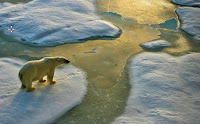 |
| Winds of Change Spring 2015 |
 |
| Winds of Change, Spring 2015 |
Following her undergraduate career, Blanchard completed a master’s degree at the University of Oklahoma studying at the South Central Climate Science Center. Her research focused on how climate and geography were impacting tribes across several states. She found that tribes were aware of climate change because it impacted them personally, socially and economically. However, she was not sure if they were trying to combat it as much as trying to survive it. She commented that the “challenge was there were 63 tribes in the area and three fourths of them are…not situated in areas that can provide economic stability.” Furthermore, she mentioned that many of the communities were struggling to find sources of quality water, to build energy-efficient homes or invest solar powered systems.
Blanchard supports the interdisciplinary approach to a climate change education because it addresses the many aspects of the tribal communities' concerns and prepares students to work with them. She recognized the importance for any one working with these communities to understand the social and cultural dynamics, the history, the economics and the politics of the community that is being supported and that “cultural competency was a must.”
Paulette is currently pursuing her PhD in the Department of Geography at the University of Kansas.
HERS provides the platform for various stages of support for programs of interest to American Indian/Alaska native communities, most recently focused on the effects of climate change on indigenous communities.
